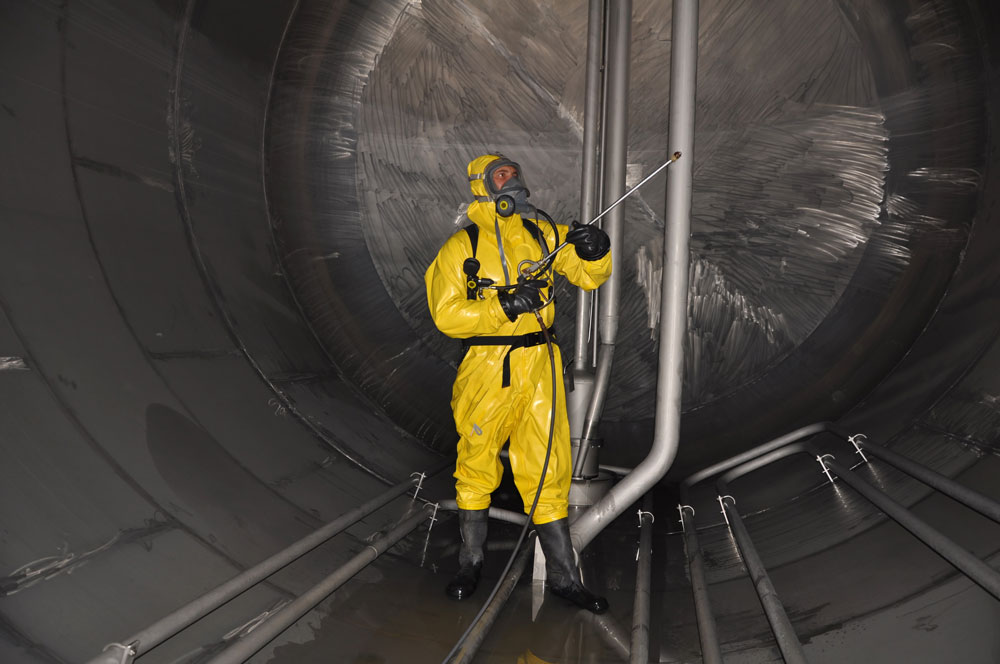The Importance Of Industrial Tank Cleaning
 CONTENTS
CONTENTS
- It keeps you and your staff safe
- It reduces the likelihood of contamination
- It makes sure you pass tank inspections
- It ensures maintenance is swift and safe
- How are industrial tanks cleaned?
- Why only professionals should clean industrial tanks
- Contact our team today
Regular cleaning of your industrial tanks is essential to prolong their lifespan, protect the contents inside, and lower the chances of a dangerous spill or leak. You must bring in professional cleaners to do this as it can be very dangerous and needs to be done thoroughly.
Here at ICE Cleaning, we offer confined space cleaning services and can clean a wide array of tight spaces, including tanks, vaults, and sewers. Our fully trained technicians can safely use their industry-leading equipment to clear out all the sludge, grime, and other dirt in your industrial tanks.
Keep reading to find out the benefits of industrial tank cleaning.
It keeps you and your staff safe
Industrial tanks can hold a range of different contents, from crude oil and fuel to acids, which could slowly eat away at the tank and affect its integrity. Sludge can accelerate this corrosion and lodge itself in the outlets, making it hazardous to use.
Frequently removing all the sludge and built-up grime keeps your employees safe, and minimises the chances of tank downtime and replacement which could be expensive.
How often you need to clean it depends on the tank’s contents, for example, industrial oil tank cleaning should occur once every three to five years.
It reduces the likelihood of contamination
When you are changing the product stored in the tank, you must have it deep cleaned. Any sludge and grime that could have built up will contaminate the next substance if not removed. Residue and impurities from the current product could also affect the new product kept there.
It makes sure you pass tank inspections
Tanks must be taken out of service and cleaned before inspectors can assess their condition. Any dirt or grime left behind may affect their ability to accurately identify problems that could become big, expensive issues in the future, like leaks and water accumulation.
It ensures maintenance is swift and safe
If you have had mechanical failures or spotted other issues with your tank, quick and effective repairs are essential. Any repairs will require the tank to be emptied and cleaned, including any vapours removed, to protect the technicians that will be fixing the problem.
How are industrial tanks cleaned?
There are two methods of cleaning tanks: man-entry cleaning where someone gets inside the tank to remove all the sludge and dirt manually, and non-man entry cleaning where cleaners flush it all out from outside the tank. The method chosen depends on the size of the tank and the entry way.
Cleaning industrial tanks and other confined spaces can be very dangerous and must always be left up to trained professional cleaners, like ICE Cleaning’s technicians. They will have the specialist equipment and experience of confined space cleaning to clean your tanks safely and thoroughly.
Why only professionals should clean industrial tanks
Firstly, depending on the contents of the tank, the substance could be highly toxic or flammable and put people’s health at risk. Fuel tank cleaning, for example, can expose people to gasoline vapour which may lead to health problems when inhaled.
Professionals will also have the personal protective equipment (PPE) and expertise of how to safely clean a tank, such as ventilating it properly. They have the necessary safety equipment, as well, like oxygen detectors to ensure the tank contains sufficient oxygen and emergency kits.
Plus, cleaners will know all the health and safety regulations, like ensuring all valves and tank components are shut off or closed, to keep themselves and others safe.
They should have the specialist equipment along with the experience using it to thoroughly clean the tanks, too, like high-powered vacuums and high-pressure water jets. Professionals will give you paces of mind that all traces of the potentially harmful substances will be removed.
Trained experts can even dispose of the waste for you at a licensed facility. Should you attempt it yourself and do it incorrectly, you could cause pollution and harm people’s health.
Contact our team today
Our technicians are fully qualified and trained in confined space cleaning, and they can safely provide industrial tank cleaning services. We can offer our services in industrial and commercial settings, and operate round the clock, nationwide. In an emergency, our technicians can be on site in hours.
Give us a call on 0208 066 0360 or send an email to enquiries@icecleaning.co.uk to book our technicians for confined space cleaning and get a free site survey and no-obligation quote.

Speak with me today,
I’m here to help
By asking you a few questions either via phone or email I can immediately provide a realistic estimation of the cost.
You’re in good company. We’ve cleaned for the following commercial clients… View all

Why choose us?
- Cater to a wide variety of cleaning situations
- Nationwide coverage, available 24/7
- Cater to commercial and domestic clients
- Free survey provided prior to quotation
- Emergency response team
- Offer a bespoke service designed to suit all your needs
- All technicians hold professional health and safety qualifications, including BICSc, IOSH, Dewpoint Professional & Safe Contractor
We’re fully accredited
We place best practise, professional expertise and health and safety at the core of our business. We’re fully compliant with all legal obligations. You can view a list of our accreditations below, or visit our Health & Safety page for more information.











-RGB-small.1707319151.jpg)




















